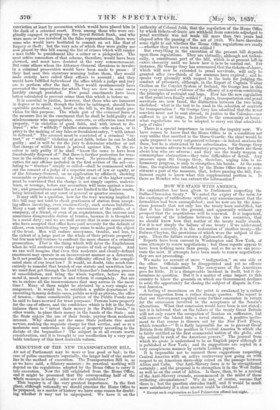HOW WE STAND WITH AMERICA.
No explanation has been given to Parliament respecting the Dallas-Clarendon tre-aty.* We noted the expiry of the term for the exchange of ratifications without any announcement that the formalities had been accomplished ; and we now see by the American journals that not only has the treaty been unratified, but that it has fallen to the ground, and apparently without any prospect that the negotiations will be renewed. It is important, on account of the relations between the two countries, that we should know how that matter of the treaty reallystands. For it is not simply the failure of one treaty ; if we understand the matter correctly, it is the restoration of another treaty—the Bulwer-Clayton, the provisions of which were the subject of dispute. Thus the failure restores a diplomatic dispute.
Reports have been current in Washington and New York, of some attempts to renew negotiations ; but these reports appear to have been nothing more than gossip, and so far as we can penetrate the mist, if attempts have been made to renew negotiations they are not proceeding.
We make no account of mere " indignation " on one side or the other. Officials may be disappointed and yet no offence may have been committed. The annoyance of the Americans goes for little. It is a disagreeable incident in itself, but it determines no question. But it is a matter of some import to this country to know the grounds on which our Government declines to seize the opportunity for closing the subject of dispute in Central America.
A feeling of uneasiness on the point is awakened by a rather curious suggestion from a rather strange quarter. The report is that our Government required some further concession in return for the concession involved in the acceptance of the Senate's alterations. What that concession would have been is not stated; but it is inferred that on the failure of the treaty Great Britain will not only renew the occupation of Ruatan on sufferance, -but will convert the island into a naval station. A positive incitement to that course is thrown out by the New York Times, which remarks—" It is flatly impossible for us to prevent Great Britain from filling the position in Central America tti which she is fairly entitled as the first commercial nation of the globe, and the second in rank.of the American powers." The journal from which we quote is understood to be an English paper although it is published at New York; and its suggestions are copied in a very conspicuous manner by certain London papers.
It is impossible not to connect these suggestions respecting Central America with an active controversy now going on with respect to an American slave-ship seized on the passage between Africa and Cuba. Our Anti-Slavery force is to be strengthened certainly ; and. the proposal is to strengthen it in the West Indies as well as on the coast of Africa. Is there, then, to be a revival of the Anti-Slavery crusade, recommenced in the midst of these irritating circumstances? We do not, of course, assume that there is but the question obtrudes itself, and it would be much more satisfactory if a clear answer could be obtained.
• Except such explanation as Lord Palmerston offered last night.


























 Previous page
Previous page